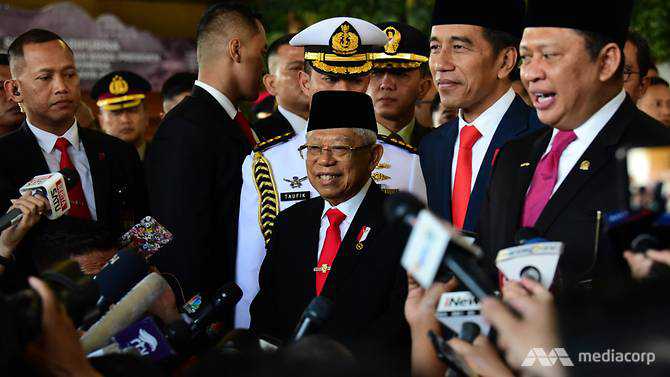Indonesian government to step up efforts to tackle radicalisation among civil servants
03 December, 2019

The Indonesian government is stepping up efforts to combat what appears to be growing radicalisation among civil servants, said Vice President Ma’ruf Amin.
In a 30-minute interview with CNA, he noted that the affected civil servants were mostly radicalised in college, before they were appointed public officers.
“Some have been influenced at local colleges, some abroad. So when they became civil servants, it was not identified because it was not part of what was tested during the recruitment process,” he said last Thursday (Nov 28).
“So even though they were exposed (to radicalism), it was not known. Many became civil servants and some even joined the state-owned enterprises.”
After various research studies and surveys, the government is redesigning the selection process for civil servants. Part of the new process is to ascertain whether they have been radicalised, he said.
This effort will involve several institutions, including the economy, education and religious affairs ministries, he added.
“For those who want to apply (as a civil servant), of course, this will be the standard of the (recruitment) tests. That means, if he/she has been exposed to radicalism, it will be known through various information, based on the interviews.
For those who are already in office, there will also be a deradicalisation (process),” the senior Islamic cleric said.
“There is information everywhere and from how he or she behaves when being re-interviewed, we can know whether the person has been radicalised. And then, we rehabilitate.”
Indonesia has grappled with radicalism for years.
In 2016, Jakarta was attacked by gunmen, killing eight people including the attackers.
It was the first terrorist attack in Southeast Asia which Islamic State (IS) claimed responsibility for. Following the attack, it was believed that some civil servants had resigned from their posts and tried to join IS in Syria.
A few weeks ago, authorities arrested a suspected terrorist identified as an employee of state-owned enterprise steel company Krakatau Steel.
In what is regarded as a clear signal to combat radicalism, President Joko Widodo has appointed Military General (Retired) Fachrul Razi as the religious affairs minister and former police chief and ex-head of the National Agency for Combating Terrorism (BNPT) Police-General (Retired) Tito Karnavian as home minister.
The government has recently launched a website for the public to inform about civil servants who are thought to have been radicalised.
There are also plans to certify ulemas and ban niqabs as well as cropped pants among civil servants.
“MORE RELIGIOUS DOESN’T MEAN MORE RADICAL”
There have been concerns over whether Indonesia, the country with the largest Muslim population in the world, has become more religious.
When asked if the average Indonesian is more religious as compared to 20 years ago, Mr Amin replied: “I think yes. More religious but that doesn’t mean more radical”.
“And more religious, but that doesn’t mean more conservative,” he added.
He noted that there are more Indonesians wearing the hijab now, while more are also taking part in religious activities.
“Friday prayers are bigger, Quran recital sessions are more crowded, but these don’t make them conservatives,” he said.
“Because we Muslims, even though we are religious, we don’t reject democracy. We don’t reject transformations, we don’t reject innovations.”
Despite that, Mr Amin stated that there are radical groups in Indonesia, apparent by the recent bombing in Medan police headquarters last month and the stabbing of then minister Mr Wiranto in October.
“We are watchful of those little groups so they don’t transmit their beliefs to society,” he said.
“COMPREHENSIVE” APPROACH NEEDED
During the interview, Mr Amin said there needs to be a comprehensive approach to tackle radicalism.
“It must be handled comprehensively. From upstream to downstream, involving various institutions, various ministries,” the senior cleric said.
“The first is making the community immune from the influence of radicalism. This must be carried out as a precaution from upstream to downstream.
From early childhood education to college, through places of worship, through religious mass organisations, through the media, including social media,” he pointed out.
In addition, deviant religious understanding must be corrected, he said.
“Counter narratives must be prepared,” he said, adding that these narratives will break the radical arguments that influenced people in the first instance.
“We have to convince them that their radicalised arguments, which they have accepted, are weak, inaccurate.”
There is also a need to manage those who have been deradicalised, including addressing their economic problems, he said.
The former leader of Nadhlatul Ulema, the world’s largest Islamic organisation, said the last step would be for the police and BNPT to prosecute the terrorists.
He noted that it involves many parties to ascertain whether someone has been radicalised.
“This involves Islamic mass organisations, religious mass organisations, and it also involves the intelligence which knows the data of individuals, and of course their actions, the attitude they show, even the movements, their radical movements.”
He added that the best way to help people “regain their consciousness” is by using influential community leaders or people who have been deradicalised.
“There are many of them. There are many groups which have regained consciousness and they can be people who we can use for deradicalisation. And this (method) has been successful.”
The Indonesian diaspora has a role to play as well, Mr Amin concluded.
“We do this via our embassies in various countries ... We use our embassies through the diasporas abroad so they take part in deradicalisation.”
Source:
TAG(s):
